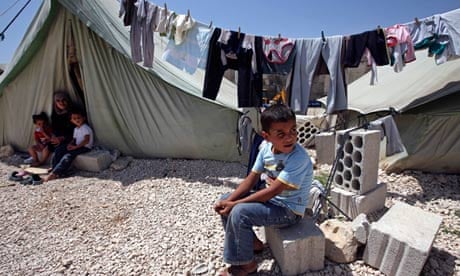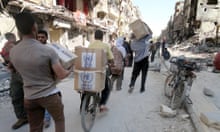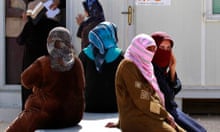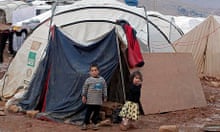The crisis in Syria is now in its third year. It has reached a state of military deadlock and diplomatic impasse, so international attention is now falling on the humanitarian response. But traditional donors and relief agencies are being stretched to the limit by a conflict that has left an estimated 93,000 people dead, forced 1.6 million people to leave the country, and displaced 4.25 million.
The UN's World Food Programme (WFP) is spending $27m (£17.7m) a week to feed Syrians and expects to be spending $42m a week by the end of this year.
Aid officials fear the situation in Syria will draw away resources from other distressed areas such as Mali and the Democratic Republic of the Congo. "So far, Syria has not affected our efforts elsewhere, but it's not a question of if but when," said Ertharin Cousin, the WFP's executive director. "Traditional donors have been extremely generous but we must expand the number of donors and we are looking to the Gulf region."
Cousin was in London for a meeting of UN agencies dealing with Syria and USAid officials, organised by the UK's Department for International Development.
Nancy Lindborg, USAid assistant administrator, hopes that others – not just the rich Gulf states, but also Russia and China – will step up, enabling the burden to be shared globally. So far, Kuwait has been the most generous Gulf funder. It hosted a conference in January that led to $1.5bn in pledges, including $300m from Kuwait.
"It was unprecedented for Kuwait to host the conference in January," says Lindborg, "and they followed through. They deserve a lot of credit."
The burden on traditional donors is all the more onerous as public appeals have not generated as much as hoped. In the UK, an appeal by the Disasters Emergency Committee (DEC), the umbrella group of charities, had raised £16m as of last month. Typically, public appeals for conflict areas raise much less than for disasters. The DEC appeal for the Haiti earthquake in 2010, for example, raised £107m.
On Wednesday, the UK hosted a meeting of UN agencies and donors to find ways to co-ordinate the humanitarian response. International development secretary Justine Greening said: "Today's meeting gave us the opportunity to assess the practical challenges but also the opportunities to improve our work to help the innocent people caught up in this terrible crisis."
The meeting looked at practical solutions including how to sustain funding, better co-ordination of the response, and improved access to – and protection of – affected populations.
The UN last month launched a $5bn appeal for Syria and surrounding countries – the largest in its history – as it warned that 10 million people, half the population, will need humanitarian aid by the end of this year.
The appeal dwarfs past requests, including the 2011 Horn of Africa food famine ($2.5bn). Yet some aid experts have warned that the Syria appeal will not be enough in a crisis where demands frequently outstrip resources.
A particular area of concern for US officials is the threat of disease as temperatures rise in the summer. Syria's public health system has collapsed. The US, which has provided $815m since the start of the crisis, is funding a disease surveillance system in rebel-held areas to enable early detection of cholera and measles.
"In the early days, medical support went towards trauma treatment," says Lindborg, "but what is new is the breakdown of the public health system. Now, we're very concerned about the threat of diseases."
The US is also worried about the effect on Syria's neighbours, particularly Jordan and Lebanon. The Zaatari camp in Jordan, housing 178,000 Syrian refugees, is effectively Jordan's fourth largest city. But most of the 495,000 refugees are in urban areas, putting a strain on schools, housing, water supplies and sanitation. The same applies to Lebanon, where sectarian lines are hardening after Hezbollah – the Shia militia – intervened to help Syrian government forces retake the border town of Qusair.
As the fighting continues, diplomatic efforts remain bogged down. A peace conference, planned for June, is unlikely to take place before September. The sticking point remains whether President Bashar al-Assad should step down; the US, Britain and the Syrian opposition all insist he must, but Russia deems his departure unacceptable.
In April, the heads of five UN agencies issued a rare joint appeal to the international community to do more to end "cruelty and carnage" in Syria. The heads of the World Health Organisation, Unicef, the Office for the Co-ordination of Humanitarian Affairs, the WFP and the UNHCR, the UN refugee agency, urged political leaders to use their influence to solve the crisis and criticised what they described as "an insufficient sense of urgency".
But, for now, humanitarian agencies are doing the heavy lifting. Cousin says WFP is funded only until the end of this month for its relief efforts inside Syria, and until August for the crisis in neighbouring countries.
"It feels like a mother on a budget trying to feed a family," she says. "Money is going out as fast as it is coming in."









Comments (…)
Sign in or create your Guardian account to join the discussion